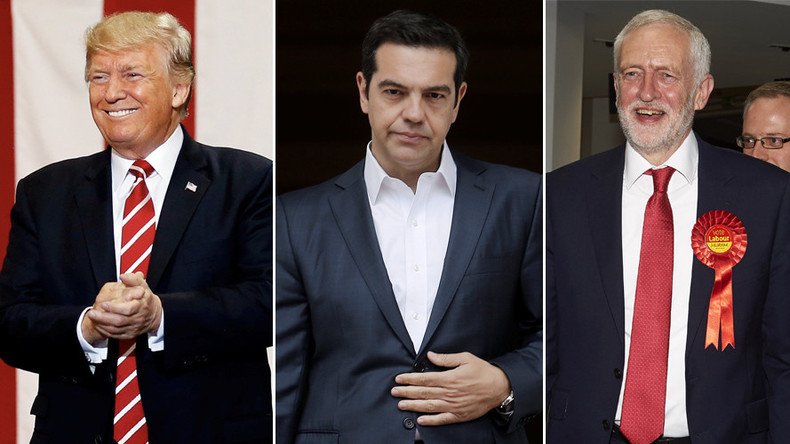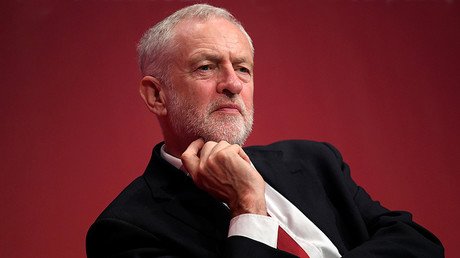Trump, Syriza & Brexit prove voting is only small part of the battle

If voting changed anything, they’d abolish it. That might sound a bit glib but consider these recent events.
In January 2015, the Greek people, sick and tired of austerity and rapidly plummeting living standards, voted for Syriza, a radical anti-austerity party. The Coalition of the Left, which had only been formed eleven years earlier, won 36.3 percent of the vote and 149 out of the Hellenic Parliament‘s 300 seats. The Greek people had reasonable hopes their austerity nightmare would end. The victory of Syriza was hailed by progressives across Europe.
But what happened?
Pressure was applied on Greece by ‘The Troika’ to accept onerous terms for a new bailout. Syriza went to the people in June 2015 to ask them directly in a national referendum if they should accept the terms.
"On Sunday, we are not simply deciding to remain in Europe, we are deciding to live with dignity in Europe,” Alexis Tsipras, the leader of Syriza, declared. The Greek people duly gave Tsipras the mandate he asked for, and rejected the bailout terms with 61.3 percent voting ‘No.'
Yet, just over two weeks after the referendum, Syriza accepted a bailout package that contained larger cuts in pensions and higher tax increases than the one on offer earlier.
The Greek people may as well have stayed at home on 27th June for all the difference their vote made.
Many supporters of Donald Trump in the US are no doubt thinking the same.
Trump won the election by attracting working-class ‘rust belt’ voters away from the Democrats and for offering the prospect of an end to a ‘liberal interventionist’ foreign policy. Yet just nine months into his Presidency the belief that Trump would mark a ‘clean break’ with what had gone before is in tatters. National conservative members of his team have been purged, while Trump has proved himself as much of a war hawk as his predecessors. Rather than ‘draining the swamp,’ The Donald has waded right into it.
The events of 2017 plainly prove as I argued here that the US is a regime and not a genuine democracy, and that whoever gets to the White House - sooner or later - will be forced to toe the War Party/Wall Street/Deep State line, regardless of what they promise on the election trail.
Let’s get out of Afghanistan. Our troops are being killed by the Afghanis we train and we waste billions there. Nonsense! Rebuild the USA.
— Donald J. Trump (@realDonaldTrump) January 11, 2013
Brits too have had a lesson in the way ‘democracy’ works when people don’t vote the way the most powerful people in the establishment want them to. On June 23, 2016, rightly or wrongly, 52 percent voted to leave the EU. But 15 months on, the view that Britain will either never leave the EU or stay in it in all but name is growing. The government only sent off Article 50 in March, after the courts held that Brexit had to be initiated by Parliament.
Last week, Prime Minister Theresa May asked the EU for a two-year ‘transition’ period after Britain is due to leave in 2019. It’s not hard to imagine the transition period will be indefinitely extended. “I’ve been voicing that fear since long before the prime minister’s dismal speech in Florence, and I see nothing to reassure me that the referendum result will be honored,”says Peter Hill, former editor of the Daily Express.
The odds of Britain still being in the EU in 2022 are now about 3-1. And they’re shortening all the time.
Calling it now: the Uber ban doesn't happen, Brexit doesn't happen, Debbie McGee wins Strictly and Palace stay up👍
— Bruce Millington (@brucemillington) September 23, 2017
Again, is that what the people who voted for Brexit in 2016 wanted to happen? The issue here is not whether we think leaving the EU is a good idea, but how the referendum vote has not led to the results that people expected.
These are not the only examples of people not getting what they thought they had voted for. In 2008, the citizens of Ireland voted to reject the EU’s Lisbon treaty. Was that the end of the matter? Not at all. They were asked to vote again - a year later - and this time the EU got the desired outcome.
In May 2012, the Socialist Party candidate Francois Hollande won a decisive victory in France’s Presidential elections. Like Syriza, he pledged to end austerity.
"I'm sure in a lot of European countries there is relief, hope that at last austerity is no longer inevitable." He declared. But guess what. Hollande didn’t end austerity. Just a year later he was pushing through a fresh round of cuts.
Proving once again the truth of the old adage: Plus les choses changent, plus elles restent les mêmes.
This wouldn’t have surprised French students of Hungarian politics as the same thing happened in Hungary in the mid-1990s. In the 1994 election Gyula Horn’s Socialist Party swept the right-wing Hungarian Democratic Forum from power, by promising to preserve the best elements of the old ’goulash communist’ system. Horn attacked energy privatization and pledged to put the interests of ordinary working Hungarians first. But the forces of Western capital had no intention of allowing any vestiges of socialism to survive in the former Eastern bloc country.
Under pressure from Western financial institutions, Horn did a spectacular U-turn, sacking genuinely progressive ministers- and appointing a neoliberal economic professor called Lajos Bokros to impose a brutal austerity program, which was far worse than anything the previous government had introduced. He also stepped up privatization.
See the pattern?
What the above examples illustrate is that regardless of how we vote, the people behind the scenes - the money men, the embedded bureaucrats, those who want to see no end to neoliberal globalization because they do so well out of it - won’t meekly accept the verdict of the people. If the ‘great unwashed’ vote the ‘wrong way,’ i.e., for Trump, for Syriza, for Brexit or for Hollande or Horn, then ways will be found to make sure that normal service is soon resumed.
There are important lessons I think here for the British Labour Party, who could be on the brink of power. Like many this week, I was hugely impressed by the speech to the conference made by Labour leader Jeremy Corbyn.
Corbyn pledged to develop "a new model of economic management to replace the failed dogmas of neo-liberalism," and linked the rise in terrorism to neocon/liberal interventionist foreign policies.
This is heresy as far as the pro-war neoliberal elites are concerned.
Opinion polls show that Labour, which registered its biggest increase in vote share in any election since 1945 earlier this year, has a consistent lead. Establishment attack dogs have been snapping at Corbyn’s heels since day one, and its utterly naïve to think that it’ll all stop if he does get the keys to Number 10, Downing Street. In fact, the war against Jez and his closest comrades will only intensify. The good news is that Labour is already planning for capital flight and a run on the pound if it’s elected. Paul Mason, a pro-Labour commentator, has said the first six months of a Corbyn government would be like ‘Stalingrad.’
Of course, you could argue that the likes of Trump, Hollande, Horn, and Tsipras were never totally committed to the program they stood on, and they said the ‘right things’ to the people just to get elected. But even if politicians are 100 percent genuine as the veteran anti-war activist Jeremy Corbyn appears to be, the pressures on them to cave in to the powerful forces behind the curtain will be immense, especially if they are putting forward policies which the elites don’t favor.
It’s clear from recent history that in modern Western ‘democracies’ voting in itself doesn’t determine outcomes. It’s what comes afterward that’s the most important.
Follow Neil Clark @NeilClark66
The statements, views and opinions expressed in this column are solely those of the author and do not necessarily represent those of RT.
















